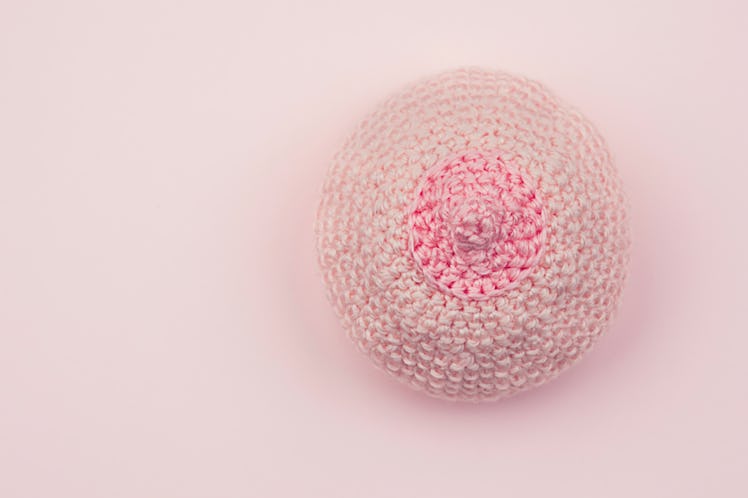
This At-Home Test Lets You Check If You Have The Breast Cancer Gene, But It's Complicated
The latest breakthrough related to breast cancer research may not be a cure, but it's a potentially groundbreaking tool for prevention, nonetheless: 23andMe's FDA approval for breast cancer genetic tests will soon allow you to gain information about your likelihood for developing the disease from the comfort of your own home. Previously, this test was only available in-house via genetic counselors. But 23andMe's FDA approval to send genetic tests straight to people's homes is a huge step toward providing individuals with the tools they need to become their own best advocates for their health.
According to 23andMe's press release, the new at-home genetic test will be available without a prescription, and it will provide information on "three genetic variants found on the BRCA1 and BRCA2 genes known to be associated with higher risk for breast, ovarian and prostate cancer." Depending on what variant of these genes you may have, the test can tell you whether you have an increased likelihood of developing cancer later in life. Women who have one of these three gene variants that 23andMe's genetic test checks for, have a 45 to 85 percent chance of developing breast cancer by age 70, according to the 23andMe press release.
The BRCA1 and BRCA2 genes, combined, account for 80 percent of all hereditary breast cancer occurrences, according to research published in the Journal of Medical Genetics.
In other words, as far as prevention goes (since breast cancer can often manifest without any hereditary signal), paying attention to the BRCA1 and BRCA2 genes is one of the most important things you can do.
It's worth noting, though, that BRCA1 and BRCA2 aren't the only genes that can serve as hereditary predictors for breast cancer, so the 23andMe test isn't totally conclusive on its own. Still, the FDA approval of the at-home genetic test makes it that much easier to stay on top of your current, and future, physical health.
And with breast cancer, staying ahead of the game can mean the difference between life and death. According to Cancer Research UK, over 90 percent of women diagnosed with breast cancer at the earliest stage of the disease survive for at least five years. In contrast, only 15 percent of women survive for at least five years when diagnosed at the worst stage of the disease.
While prevention and staying on top of your health is always a good thing, an at-home genetic test might be a little bit complicated in practice, on a psychological level.
The at-home genetic test for breast cancer may be efficient from a scheduling standpoint, but it also poses potential emotional risks.
When someone takes a genetic test in-house with a genetic counselor, they have the added benefit of learning about this potentially life-threatening news with a professional who is educated on how to give the information, and who can offer next steps, should the person test positive for one of the gene variants. According to Betsy Nilan, president of the Get In Touch Foundation, a non-profit dedicated to providing breast health education and initiatives to young women across the globe, you should only take a genetic test if you're ready to act upon the results.
"The decision to test, act, or not act on positive results, is a complex decision-making process... and should be a personal decision that is right for the individual woman herself," Nilan tells Elite Daily.
Nilan's own mother, Mary Ann Wasil, was diagnosed with breast cancer at the age of 39, which was what led Wasil to create the Get In Touch Foundation (Nilan took over after her mother passed away in 2016). Nilan admits that her experience watching her mother's courageous fight with breast cancer has impacted her opinion on whether or not she wants to get a genetic test done.
"After seeing my mom sick for so many years, and watching her pass away, I have no problem with going through testing, and plan to take those next steps very soon," Nilan tells Elite Daily. However, she adds that she'd personally prefer to do this in-house with a genetic counselor, so that she can get the support she needs.
"The role of the genetic counselor," Nilan explains, "is to look at family history, assess cancer risk, decide which genetic test is most appropriate, if applicable, for an individual, and to move forward by creating a plan for risk management or prophylactic treatment."
As Nilan has noted, taking this test at home poses the risk of a person finding out potentially terrifying medical information all on their own.
By getting that information alone, Nilan explains, the individual might not know exactly how to move forward. If you want to take 23andMe's at-home test, Nilan recommends speaking to a doctor beforehand, so that you have a medical professional who's only a call away once you get the results.
Learning more about your body is always a good thing. But it's crucial to go about something like this in a comfortable and supported way so you don't get overwhelmed, and to ensure you know what all of your options are, and how to access them.